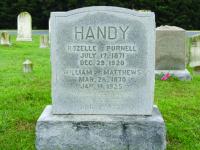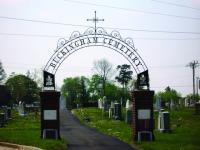Female Freedom Fighter
for Worcester County
Author’s note: This article was inspired by my pack-rat mother who, while perusing one of her favorite yard sales, found a book that contained an unfamiliar sticker. It simply read “The Friendly Library, Anchuka, Berlin MD”. Being the curious question-asking woman that she is, she absolutely had to find out about this mysterious place. Thus, we started researching and what follows is the result.
If my father hadn’t read to me at night, sleep would not have come as easily. If not for the feel of a favorite book and the pictures of star-bellied Sneetches, my dreams may have been different. They were truly peaceful and beautiful. That is the effect a book had on a child’s life. So, how do books and literature touch lives? Are we losing an important part of history because we are inundated with mass media? Can something as simple as a book not only comfort a child’s mind, but also contribute to ensuring freedom?
When we think of freedom fighters, a picture comes to mind of those men who fought wars with guns; and some of them were. Then again, what about the peaceful people who affected this great nation’s freedom from their own homes? Rozelle Purnell Handy lived and worked in Worcester County in 1900. In fact, her contributions toward improving literacy in her part of the world rival the efforts of any great American freedom fighter.
A woman of ailing health, Ms. Handy relocated to Worcester County to recover and discovered a county floundering for education. School enrollment hovered at around fifty-one percent based on an agricultural economy where many children had to work their family farms and spend much of the winter fishing. In addition, they lacked available literature. Rozelle identified a problem and sought to solve it. With concentrated effort, she established an organization in the Berlin area called the Friendly Library.
Though little is known about Rozelle’s formal education, during her lifetime, three branches of her family bequeathed Ms. Handy their libraries, perhaps contributing to her immense obligation and interest in literacy. Her family lineage, including her parents Moses and Sarah Matthews Handy, boasts a litany of writers. Rozelle, also a writer, created fiction for the Chicago Inter-Ocean.
Using her vast resources, Rozelle emerged in the community providing educational opportunities to young people and forming the Friendly Library. It began in her house where, including her own collection, a variety of books arrived from sources such as other generous citizens. The library expanded into the largest collection in the county. Books surrounded Rozelle’s porch, dining room and two walls stacked floor to ceiling.
A lending system soon began, making it closer to the entity we have today: the public library. The Friendly Library contained more than 5000 magazines, books and periodicals, and 8000 pieces of literature were borrowed per year. Rozelle also took her library on the road. Using a horse and buggy that became familiar to the locals, she formed a “book mobile” that lent literature to those who did not, or perhaps could not, come to her. Soon, an age of enlightenment began in a stunted community.
In 1910, The Berlin Library Association, formed by a group of concerned local women, immerged with eight dollars in their fund. However, the need for a formal library, in an actual building, still remained. The women were able to procure a building and funding through memberships that provided an electrified location for a library. The association solicited donations for books. Thanks to Rozelle Handy’s Friendly Library, thousands of pieces of literature became available.
The Berlin Library Association’s established library went through two wars and an influenza epidemic during WWI that forced its closure on at least one occasion. They reopened during practical times and kept their system of volunteerism and free lending. WWII saw the last closure until 1951 when the State Library Extension Service, with local government support, reestablished the library in Berlin. In 1960, The Worcester County Library System made it the Berlin Branch and a building appropriate for the community’s needs was built in 1970. Book lending increased by three-hundred percent.
In a letter recorded in the Americanization Bill of 1919, James Handy touts his sister’s benevolence and concern for her community. According to her brother, Rozelle Purnell Handy’s contributions to her area were paramount. Through her book-lending efforts he claimed that the neighborhood had magically changed in terms of literacy rates. During WWI, and its call for volunteers, various government entities boasted about the citizens of the area. It was said that they were civically enlightened and could read necessary documents, thus making them good recruits.
Additionally, Rozelle also practiced the duties of a civic-minded citizen. In 1919, The Women’s Club of Worcester County established itself and she became their first president; Ms. Handy was also a staunch supporter of the women’s suffrage movement. She died in 1920.
Rozelle Purnell Handy lived only 49 years; but in those years she was extremely prolific in her achievements. A teacher, writer and book lover, her influence impacted the community by providing a knowledge-starved area with increased literacy. As a result, she freed her part of the world from a possible life of ignorance, making her a true freedom fighter for her area.

